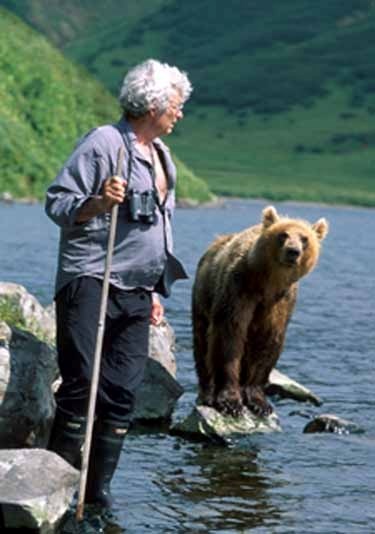Growing up in Waterton Valley, Charlie Russell saw his fair share of wildlife through his family’s outfitting and filmmaking businesses.
But it was the bear that drew his attention, said Russell, an Albertan who has spent about 50 years studying and interacting with grizzlies, black bears and spirit bears in their natural habitat.
“I saw this animal as it was — it was so beautiful and so intelligent,” said Russell, an author and photographer, and former rancher and guide. “There were so many things about the grizzly bear I could relate to.”
He saw the animal as a very social animal, one that wanted to get along with humans, he added. Since then, Russell has spent his life trying to show people what the relationship between humans and bears could be.
Bragg Creek and area residents will have the chance to hear Russell share his experiences with grizzlies firsthand, as the world-renowned bear expert takes centre stage Oct. 19 at the Bragg Creek Community Centre.
The presentation, titled ‘50 Years Living with the Great Bears,’ is set to begin at 2 p.m.
“This presentation is great for people who are interested in living better with the animals around them,” said Russell over the phone from his home near Waterton Lakes National Park. “My experiences are about bears, but the lessons apply to all animals.”
The founding director of the Pacific Rim Grizzly Bear Co-existence Study, Russell has spent time in British Columbia with spirit bears, as well as completing an 18-year exploration of grizzlies at his ranch situated near the border of Alberta and Montana.
In addition, he spent a decade examining how human fear and aggression has shaped the human-bear relationship. To do this, Russell lived among brown bears in Kamchatka, Russia. He, alongside his project partner, Maureen Enns, raised 10 orphaned cubs in the study.
“It was mind-blowing what happened with that experience,” he said. “If you are kind, you get kindness back. If you give harshness, you get harshness back.”
Russell said he returned from Russia knowing the problem with the human-bear relationship was due to humans, not the bears.
His experiences gave him the confidence to share his lessons.
By sharing his extensive experiences, Russell said he’s hoping to eliminate the fear that defines the relationship between humans and the four-legged wild animals.
He said the harshness with which bears are managed isn’t necessary.
“Sure, bears can be dangerous — but we need to look at how they are becoming dangerous,” said Russell. “It’s an erosion of trust.”
Russell admitted that more relaxed management techniques can be difficult to implement in parks due to the number of tourists. Still, he expressed concern over low bear tolerance policies and the response of officials to “habituated” bears.
“The idea is that any bear that doesn’t run away is habituated,” he explained.
“But sometimes the bear doesn’t want to run away — it’s busy. Maybe it’s eating berries and that’s more important than running away from hikers.
“(Humans) are the unpredictable ones. Bears don’t know what the hell we’re doing.”
It’s a slow process, said Russell, adding that he has seen glimmers of improved bear management practices in certain areas. He named Banff National Park as one such location.
Tickets to Russell’s presentation at the Bragg Creek Community Centre are $20 at the door.




